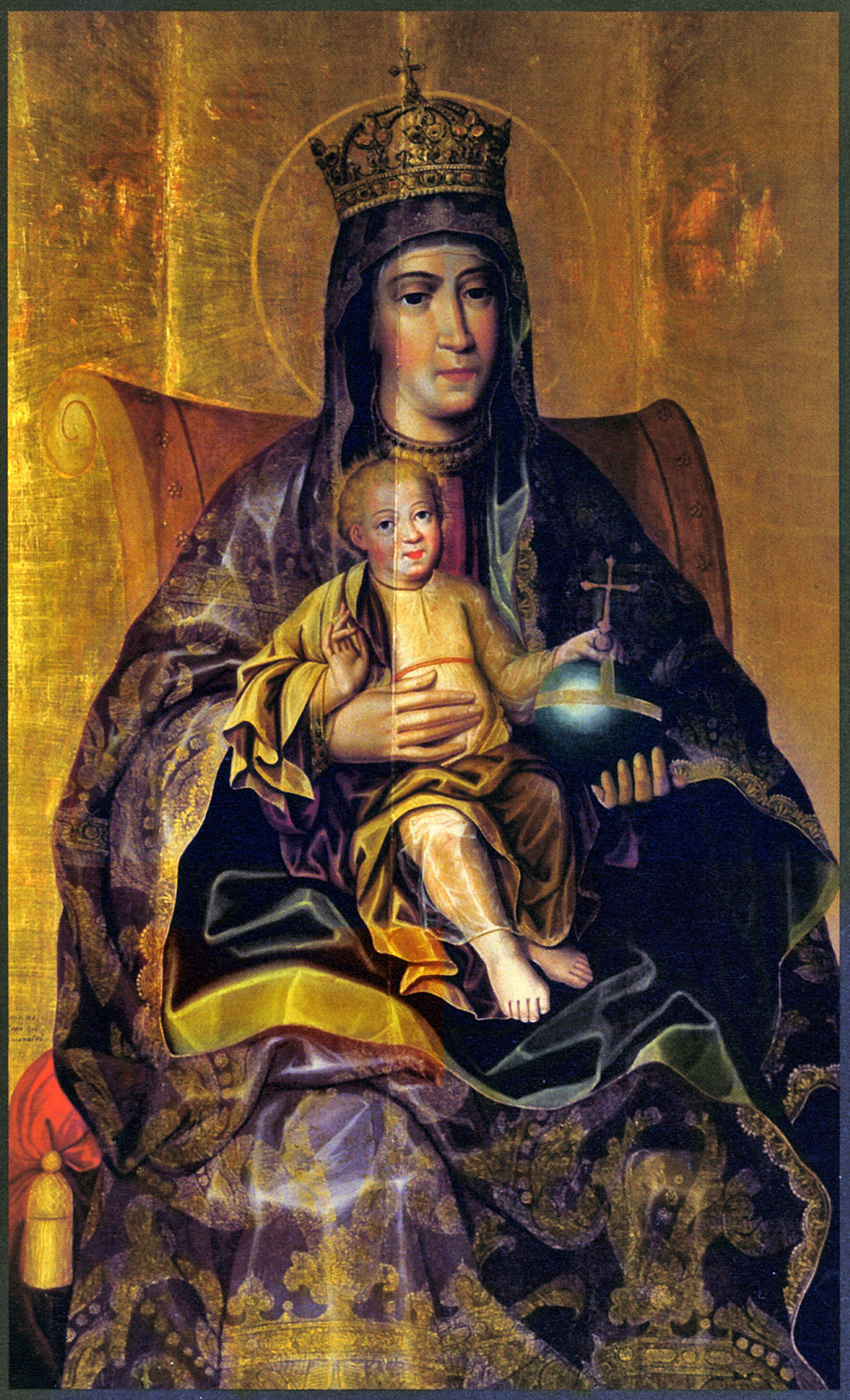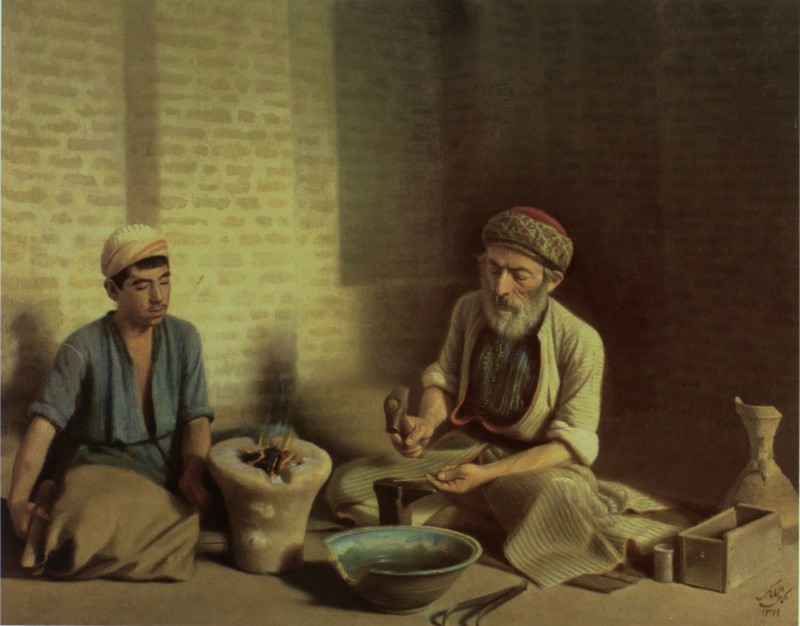|
Zolotaryov
Zolotaryov or Zolotarev; feminine: Zolotaryova or Zolotareva (russian: Золотарёв, Золотарёва) is a Russian-language occupational surname derived from the occupation of золотарь, or goldsmith. It may be transliterate in German as Solotaroff. Notable people with this surname include: *Aleksandr Zolotarev (1879–1938), Ukrainian politician, statesman and journalist *Aleksandr Zolotarev (athlete) (born 1940), Soviet athlete *Anastasia Zolotareva (born 2002), Russian tennis player * Boris Zolotaryov (born 1953), Russian politician *David Zolotarev (1885–1935), Russian anthropologist and ethnographer *Karp Zolotaryov (fl. last quarter of the 17th century), Russian icon painter *Vasily Zolotarev (1872–1964), Russian composer *Vladislav Zolotaryov (1942–1975), Russian composer *Yegor Zolotarev (1847–1878), Russian mathematician See also *Solotaroff Solotaroff is a German-language transliteration of the Russian surname Zolotaryov. Notable people with ... [...More Info...] [...Related Items...] OR: [Wikipedia] [Google] [Baidu] |
Karp Zolotaryov
Karp Ivanovich Zolotaryov (russian: Карп Иванович Золотарёв, fl. last quarter of the 17th century) was a Muscovite painter, interior designer and wood carver, employed by Posolsky prikaz and the Kremlin Armoury. Zolotaryov was the author of iconostasis of the Transfiguration church in Novodevichy Convent and the Church of the Intercession at Fili and the icons of Donskoy Monastery. Surviving paintings by Zolotaryov, created in the period directly preceding the reforms of Peter I, form a bridge between traditional Orthodox icon painting and the modern realistic painting introduced in Russia in the 18th century. Biography The identity of Karp Zolotaryov was discovered in archives by Ivan Snegiryov and first published in print in 1857. For the next hundred years Zolotaryov was known only through archival evidence: historians knew the sites where he worked and the themes of his icons but could not positively attribute the unsigned icons to the artist. In 1 ... [...More Info...] [...Related Items...] OR: [Wikipedia] [Google] [Baidu] |
Vladislav Zolotaryov
Vladislav Andreyevich Zolotaryov (russian: Владислав Андреевич Золотарёв, De-Kastri, September 13, 1942 – Moscow, May 13, 1975) was a Soviet composer and bayanist. He is regarded as one of the greatest Soviet composers for bayan. He graduated from the class of N. A. Lesnoi (bayan) at the Magadan Secondary School of Music in 1968, and studied composition under the guidance of R. K. Shchedrin (by way of consultation, 1968–1969), and with T. N. Khrennikov (at the Moscow Conservatoire, 1971–1972). He composed large-scale and chamber compositions, string quartets and vocal music, but is best known for his works for bayan (button accordion). Friedrich Lips and A. Surkov wrote in ''Anthology of Compositions for Button Accordion'': "The creative work of Vl. Zolotaryov can be described as a milestone of the utmost importance for the incontestable progress of accordion music. . . . In his ''Partita'' (1968), ''Six Children's Suites'' (1969/74), his ''So ... [...More Info...] [...Related Items...] OR: [Wikipedia] [Google] [Baidu] |
Boris Zolotaryov
Boris Nikolayevich Zolotaryov (13 March 1953) was the head of administration of Evenk Autonomous Okrug (8 April 2001 Radio Free Europe/Radio Liberty, 9 April 2001. Retrieved 25 June 2011. – 31 December 2006). He is a graduate of Evening Faculty of Moscow Institute of Electronic Technology
National Research University of Electronic TechnologyEnglish official name for international usage.Contact informa ... in 1984.
Refe ...
|
Vasily Zolotarev
Vasily Andreyevich Zolotarev, also romanized as Zolotaryov (russian: Василий Андреевич Золотарёв; February 24, 1872 in Taganrog – May 25, 1964 in Moscow), was a Russian (Soviet) composer and music teacher. Biography Vasily Zolotarev was born to a Greek family named Kuyumzhi (Куюмжи) or Kouyoumtzis in the city of Taganrog in 1872. The family name was later changed to the more Russian Zolotarev. He studied music at the Saint Petersburg Conservatory under direction of Mily Balakirev (1893–1898) in the class of Nikolai Rimsky-Korsakov (1898–1900), graduating in 1900. Zolotarev lectured at Moscow Conservatory (1909–1918), at the Belarus State Academy of Music (Белорусская государственная консерватория им. А. В. Луначарского) in 1933–1941, and other conservatories. Among his students in Minsk was Mieczysław Weinberg. Zolotaryov was a prolific composer and left behind a large body of works ... [...More Info...] [...Related Items...] OR: [Wikipedia] [Google] [Baidu] |
Aleksandr Zolotarev
Aleksandr Zolotarev (1879-1938) was a Ukrainian politician, statesman and journalist. Zolotaryov was born into a poor Jewish family. He graduated from the Law faculty of the Moscow State University. In 1898 for his revolutionary activity Zolotaryov was exiled to Kherson Governorate and later Poltava Governorate. In 1904 he emigrated to Austria-Hungary and returned in 1907. In 1915-17 Zolotarev worked in Moscow. In 1917 he returned to Kiev and became a member of the Central Council of Ukraine from Jewish Bund. Along with it Zolotarev was a member of the Kiev city Duma, All-Ukrainian council of workers' deputies and state controller for the General Secretariat of Ukraine. at the |
Solotaroff
Solotaroff is a German-language transliteration of the Russian surname Zolotaryov. Notable people with this surname include: * Hillel Solotaroff (1865–1921), Russian–American doctor known for his participation in the New York Yiddish anarchist movement * Lynn Solotaroff (1929–1994), American translator of Tolstoy and Chekhov * Ted Solotaroff Theodore "Ted" Solotaroff (October 9, 1928 – August 8, 2008) was an American writer, editor and literary critic. Life and career Born into a working-class Jewish family in Elizabeth, New Jersey, Solotaroff attended the University of Michigan, gr ... (1928–2008), American writer, editor and literary critic {{surname category:German-language surnames category:Russian-language surnames ... [...More Info...] [...Related Items...] OR: [Wikipedia] [Google] [Baidu] |
Occupational Surname
In some cultures, a surname, family name, or last name is the portion of one's personal name that indicates one's family, tribe or community. Practices vary by culture. The family name may be placed at either the start of a person's full name, as the forename, or at the end; the number of surnames given to an individual also varies. As the surname indicates genetic inheritance, all members of a family unit may have identical surnames or there may be variations; for example, a woman might marry and have a child, but later remarry and have another child by a different father, and as such both children could have different surnames. It is common to see two or more words in a surname, such as in compound surnames. Compound surnames can be composed of separate names, such as in traditional Spanish culture, they can be hyphenated together, or may contain prefixes. Using names has been documented in even the oldest historical records. Examples of surnames are documented in the 11th ce ... [...More Info...] [...Related Items...] OR: [Wikipedia] [Google] [Baidu] |
Goldsmith
A goldsmith is a Metalworking, metalworker who specializes in working with gold and other precious metals. Nowadays they mainly specialize in jewelry-making but historically, goldsmiths have also made cutlery, silverware, platter (dishware), platters, goblets, decorative and serviceable utensils, and ceremonial or religious items. Goldsmiths must be skilled in forming metal through file (tool), filing, brazing, soldering, sawing, forging, Casting (metalworking), casting, and polishing. The trade has very often included jewelry-making skills, as well as the very similar skills of the silversmith. Traditionally, these skills had been passed along through apprenticeships; more recently jewelry arts schools, specializing in teaching goldsmithing and a multitude of skills falling under the jewelry arts umbrella, are available. Many universities and junior colleges also offer goldsmithing, silversmithing, and metal arts fabrication as a part of their fine arts curriculum. Gold Com ... [...More Info...] [...Related Items...] OR: [Wikipedia] [Google] [Baidu] |
Aleksandr Zolotarev (athlete)
Aleksandr Zolotarev (born 13 March 1940) is a Soviet athlete. He competed in the men's triple jump at the 1968 Summer Olympics The 1968 Summer Olympics ( es, Juegos Olímpicos de Verano de 1968), officially known as the Games of the XIX Olympiad ( es, Juegos de la XIX Olimpiada) and commonly known as Mexico 1968 ( es, México 1968), were an international multi-sport eve .... References External links * 1940 births Living people Athletes (track and field) at the 1968 Summer Olympics Soviet male triple jumpers Olympic athletes for the Soviet Union Universiade medalists in athletics (track and field) FISU World University Games silver medalists for the Soviet Union {{USSR-athletics-bio-stub ... [...More Info...] [...Related Items...] OR: [Wikipedia] [Google] [Baidu] |
Anastasia Zolotareva
Anastasia Aleksandrovna Zolotareva (russian: Анастасия Александровна Золотарёва born 18 January 2002) is a Russian tennis player. Zolotareva has a career-high singles ranking by the WTA of 243, achieved on 30 January 2023. She also has a career-high WTA doubles ranking of world No. 330, set on 17 July 2023. She has won twelve singles and nine doubles titles on the ITF Women's World Tennis Tour. Zolotareva won her biggest title to date at the 2022 President's Cup, where she partnered with Mariia Tkacheva Mariia Sergeevna Tkacheva (russian: Мария Сергеевна Ткачева born 17 December 2001) is a Russian tennis player. Tkacheva has career-high rankings by the WTA of 331 singles and 362 in doubles, both achieved October and Novemb ... to win the doubles tournament. ITF Circuit finals Singles: 13 (12 titles, 1 runner-up) Doubles: 18 (9 titles, 9 runner-ups) References External links * * {{DEFAULTSORT:Zolotareva, Anasta ... [...More Info...] [...Related Items...] OR: [Wikipedia] [Google] [Baidu] |
David Zolotarev
David Alekseevich Zolotarev (August 29, 1885 – September 10, 1935) was a Russian anthropologist and ethnographer who studied the tribal populations of the Yaroslavl region of northern Russia. In his capacity as professor of anthropology at the University of Leningrad and as a representative of the Russian Geographical Society’s Ethnographic Division, Zolotarev led numerous anthropological expeditions, and would later report the findings in published research papers and at scientific conferences. Following the Russian Revolution, the Soviet government called on Zolotarev and other anthropologists to determine how the isolated ethnic populations of the northern Russian regions were able to adapt to the new Communist society. During the 1920s, Zolotarev studied the Karelian population who lived at the Russian-Finnish border region. In measuring the physical characteristics and social customs of this population, Zolotarev’s findings were used by the Soviet government to dete ... [...More Info...] [...Related Items...] OR: [Wikipedia] [Google] [Baidu] |
Floruit
''Floruit'' (; abbreviated fl. or occasionally flor.; from Latin for "they flourished") denotes a date or period during which a person was known to have been alive or active. In English, the unabbreviated word may also be used as a noun indicating the time when someone flourished. Etymology and use la, flōruit is the third-person singular perfect active indicative of the Latin verb ', ' "to bloom, flower, or flourish", from the noun ', ', "flower". Broadly, the term is employed in reference to the peak of activity for a person or movement. More specifically, it often is used in genealogy and historical writing when a person's birth or death dates are unknown, but some other evidence exists that indicates when they were alive. For example, if there are wills attested by John Jones in 1204, and 1229, and a record of his marriage in 1197, a record concerning him might be written as "John Jones (fl. 1197–1229)". The term is often used in art history when dating the career ... [...More Info...] [...Related Items...] OR: [Wikipedia] [Google] [Baidu] |


